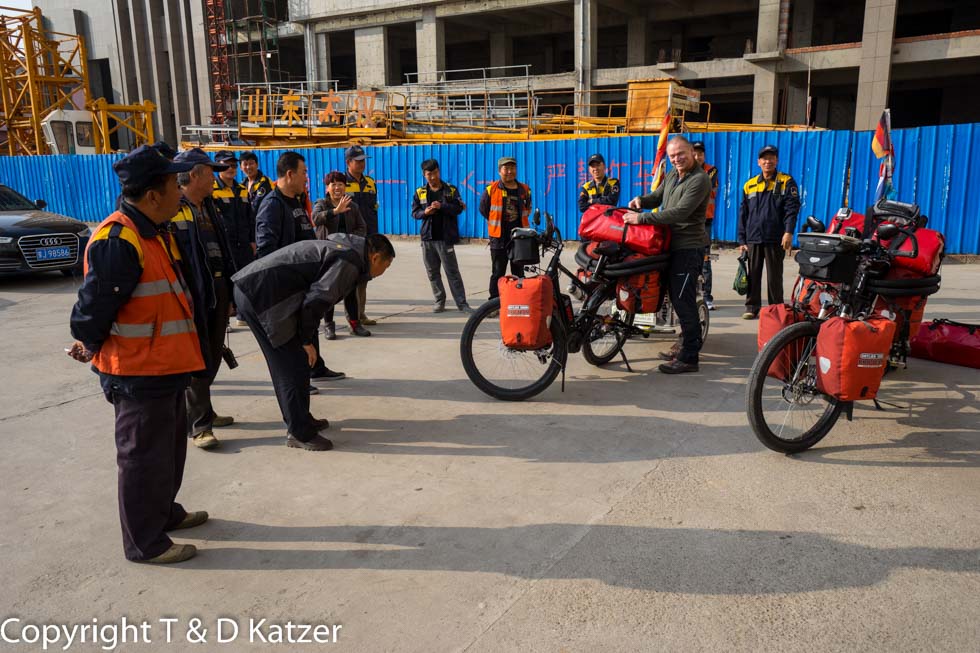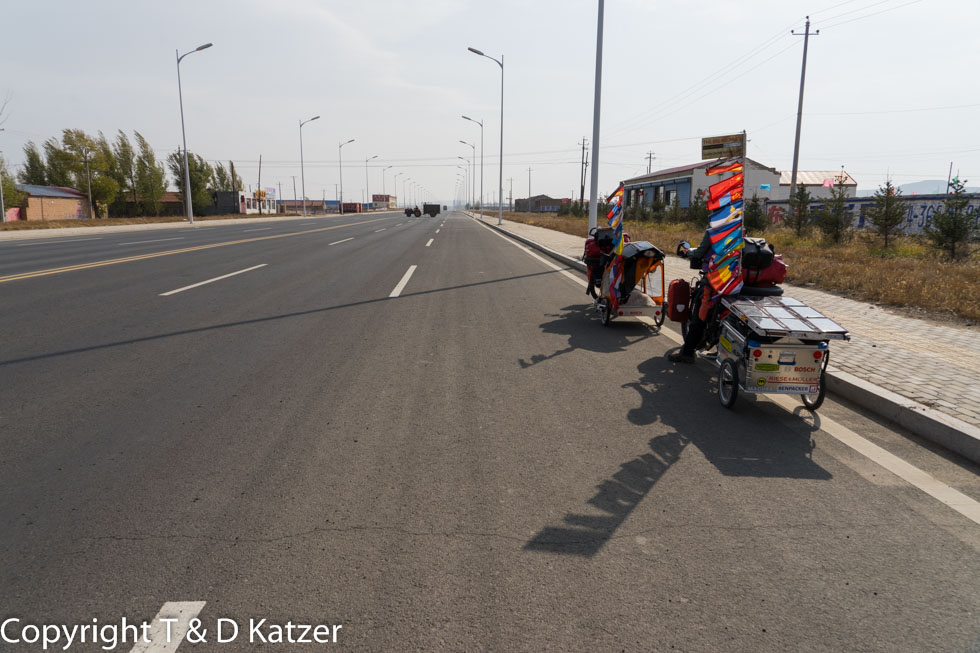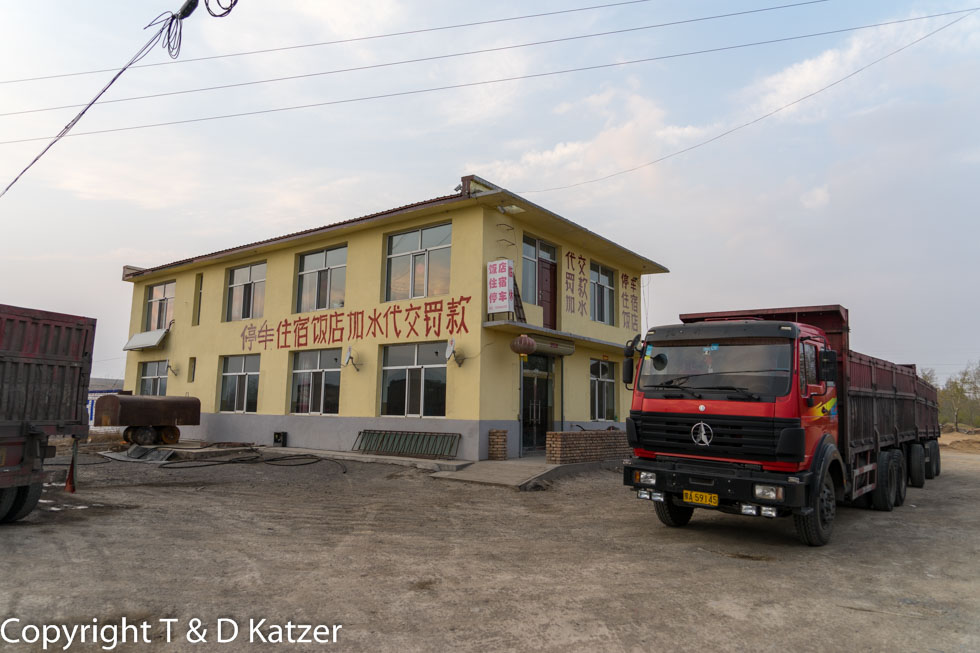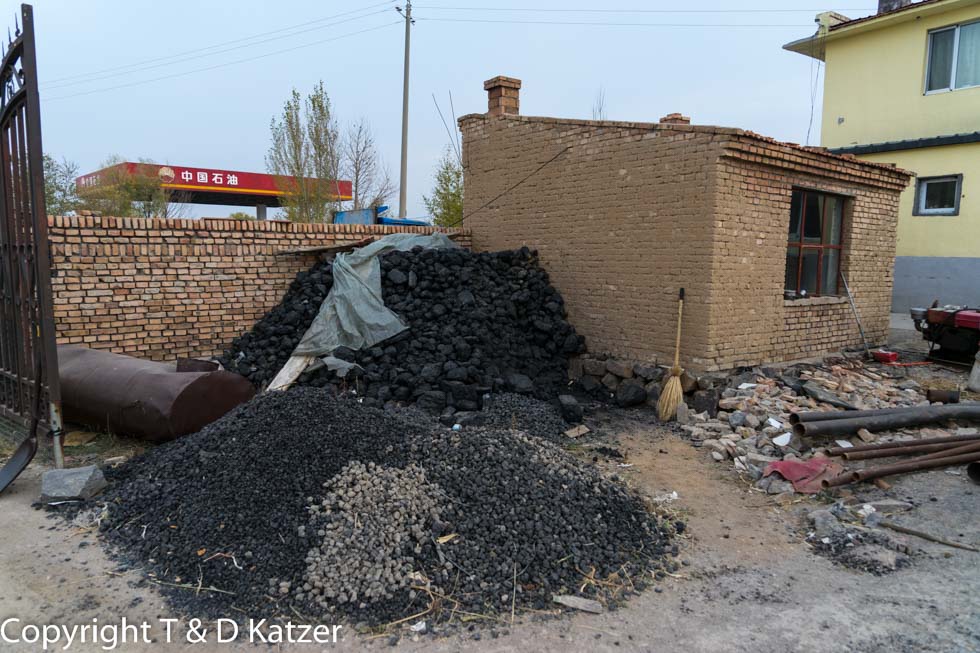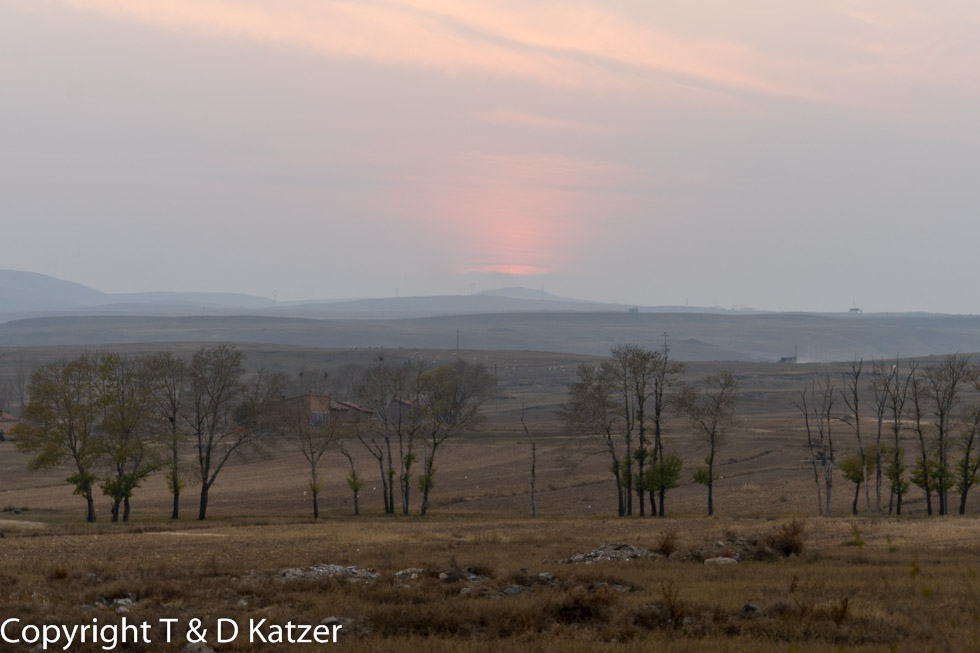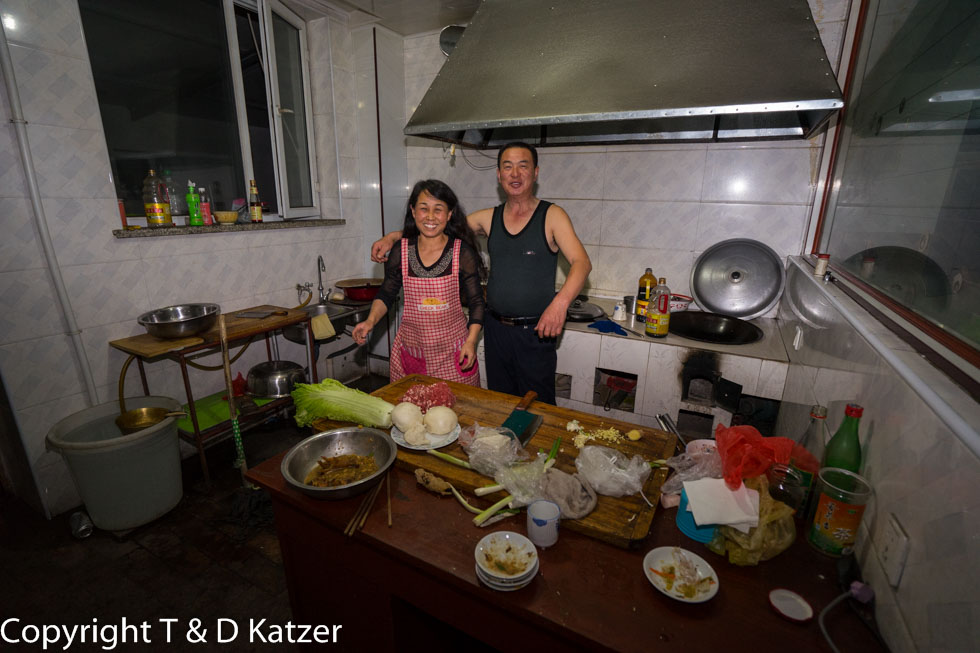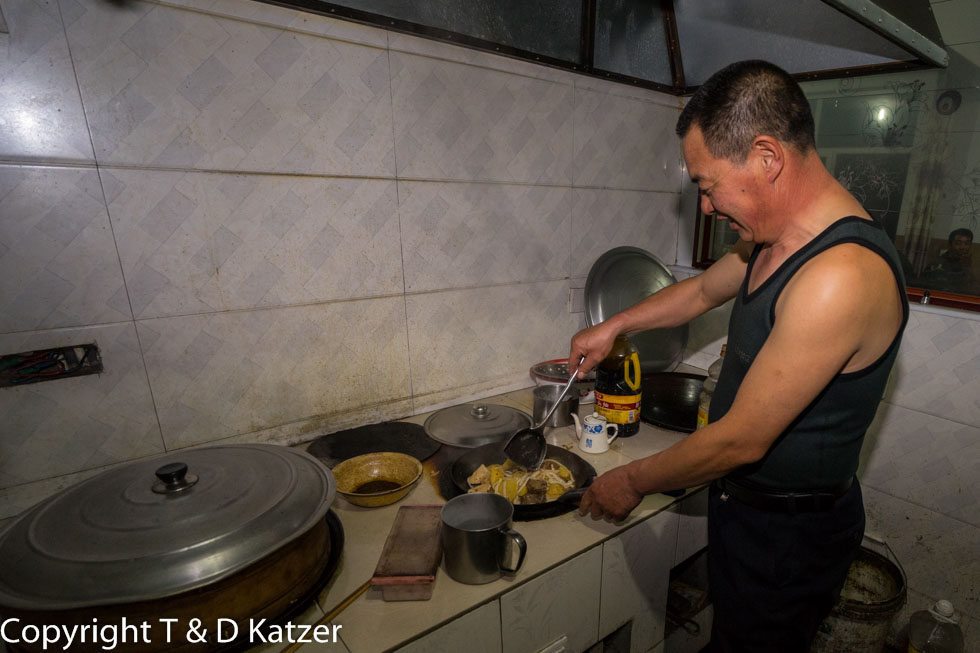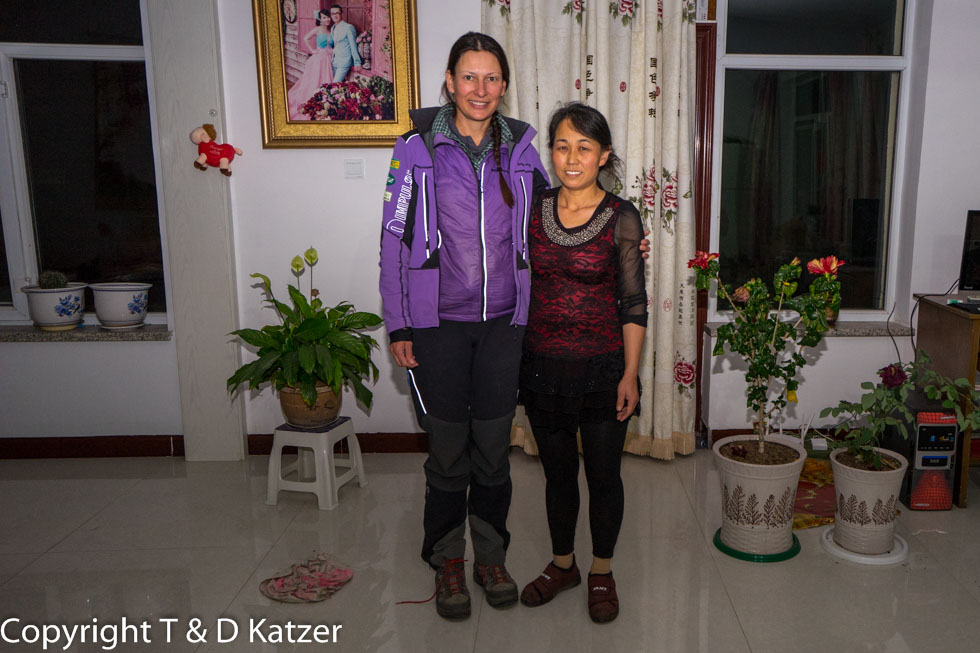
Disoriented and like flotsam on the ocean
N 40°46'18.4'' E 113°08'57.1''
Date:
20.10.2015
Day: 114
Country:
China
Location:
Togrog Ul
Latitude N:
40°46’18.4”
Longitude E:
113°08’57.1”
Daily kilometers:
79 km
Total kilometers:
9,851 km
As the crow flies:
50,33
Average speed:
21.8 km
Maximum speed:
50,5
Travel time:
3:35 hrs.
Soil condition:
Asphalt
Maximum height:
1.400 m
Total altitude meters:
5.550 m
Altitude meters for the day:
405
Crosswind Wind force: 7
50 km/h
Headwind Wind force: 7
50 km/h
Sunrise:
06:42 am
Sunset:
5:42 pm
Temperature day max:
18 °C
Night temperature:
0 °C
Departure:
09:40 a.m.
Arrival time:
3:00 p.m.
Total plate tires:
8
Plate front tire:
2
Flat rear tire:
5
Plate trailer tire:
1
(Photos of the diary entry can be found at the end of the text).
It explodes, crashes and whistles as we load our bikes in front of the hotel. Another wedding is taking place, which is why some young men in the bridal party scare away all the birds in the area with a fierce firework display and old people with hearing difficulties are startled into dropping their teacups. “Take Ajaci into the house!” I shout to Tanja, who starts to howl in confusion at the noise. Within a few minutes, the square in front of the hotel is completely filthy with paper and powder residue. The manager of the house storms outside over the red carpet, which suggests to the guests that they are something special, and vigorously stops the firing of further cannon salvos. Since we have been in China, we have seen fireworks in every city, whether day or night. The Chinese seem to use every occasion for this. The small town of Zhuozishan, with a population of around 240,000, is particularly busy. Admittedly, I was a fan of fireworks in my previous life, but here the noise really gets on my nerves. The additional fine dust pollution in the air, the dirt left behind and the noise pollution for all people and animals are enormous in some cities.
Another group of interested people gathers around us. The e-bikes are marveled at. “How much does a bike like this cost?” is a frequently asked question. As I don’t want to shock people, I answer with a shrug of the shoulders. The initially grumpy-looking manager of the hotel smiles and tells the questioners with audible pride in her voice where her exotic guests come from and where they are going. She answers many questions and seems to know more about us than we told her.
“Zaijian! Zaijian! Zaijian!” (Goodbye), they shout as we set our horses in motion in the best weather. Although we are cycling back to Ulanqab today, we are in a great mood. The south-westerly wind blows at our backs. You could be forgiven for thinking that the inclines, which demanded so much of us on the way there, were bowing down to us, so that we overcame them with ease. After just under 2 ½ hours, we pass the city of Ulanqab, home to two million people, on the wide ring road. Suddenly it splits into several directions. The signs written in Chinese are useless to us. To my despair, our GPS device suddenly failed and the MAPS.ME map program often uses different city names than Google Maps, making navigation increasingly challenging for me. “Stop!”, I shout, and so that Tanja doesn’t crash into my trailer, I always raise my right hand as well. “What is it?” “I don’t know which of the roads we should follow,” I reply, bent over my map, on which you can’t make out any details because of the 1.27 million scale. I nervously switch my smartphone off and on again, hoping to bring MAPS.ME back to life. I suddenly have the feeling that we are drifting aimlessly on the ocean. For the first time in my expedition and travel life, orientation has become a problem, and that on a bike trip. On all previous expeditions, especially desert crossings, we always had two GPS systems in our luggage for safety reasons. On our cycling expedition from Germany to here, we saw no reason to burden ourselves with a second device. Due to the reporting and documentation of our trip, a large part of the equipment consists of technical devices. Actually far too much weight for a bike trip. To ensure the continuity of the publications, many things are duplicated in the luggage, but a GPS is not. In this case, the dogs are biting us and I’m annoyed at having saved in the wrong place. But what is the wrong place? In Erenhot we had to wait because of the tires and the drawbar. Should we have taken these parts with us too? At some point even the best bike breaks down, at some point even an e-bike drive can no longer compensate for this and at some point even well-trained bodies are no longer able to carry everything. So devices fail and if this is the case we have to have them sent to us in an emergency. But at the moment I’m standing there like an ox in front of a mountain, wondering which turn is the right one. A wrong decision can quickly cost us 20, 30 or 50 kilometers, and since we need additional power for our batteries, it can be a reason to break down on the route. As the sun is shining down on us from the firmament at this hour, I know at least the rough direction of the sky. But does it make sense to follow her? What if the road suddenly curves and takes its drivers in a completely different direction? “Man oh man. What a bummer,” I grumble as MAPS.ME suddenly catches and shows me our current position. “Bingo! We’re back on track!” I shout happily. “We can’t turn off here. In a few kilometers there is a bridge where we have to cross the railroad tracks and then turn right. After that, we should always go straight ahead.” Relieved, we let the rubber roll under us again and follow the G208 southwards. As soon as we have changed direction, the south-westerly wind blows towards us at force 7 (55 km/h) and the dream of gliding along is suddenly over. On some of the climbs we are forced to downshift to fifth gear. The maximum speed that we can achieve despite the full use of our thigh muscles is 8 or 9 km/h. Panting and on the verge of falling over due to our heavily laden bikes, we pant up the climbs. “Denis!!!” it roars behind me against the evil wind. “Yes?!” “Why don’t you let Ajaci get out?” I immediately apply the brakes. “That I hadn’t thought of that before?” I say. To save energy, we let Ajaci run alongside me on every incline from now on. At least if the traffic isn’t too bad and the asphalt isn’t sharp-edged. In this way we work our way against the gusts and up and over the elevations without Ajaci’s paws being damaged.
At 3 p.m. I spot an ugly yellow house on the side of the road with trucks parked in front of it. “I think there’s something to eat,” I guess and steer my buck onto the sandy forecourt. “Is this a restaurant?” wonders Tanja. “I’ll ask,” I reply and enter the building. I am immediately greeted by pleasant warmth. I actually find myself in a simple street restaurant. The tables almost collapse with leftovers. Everything that no longer fits on it is scattered in mountains on the floor. The sight almost takes my breath away. A man is lying in the middle of the room on a kind of bed. My “Ni hao” (good day) wakes him up with a crumpled face. When I ask if there is anything to eat, he looks at me as angrily as if I had just offered him a beating for this mess. He nods, or at least that’s what I understood from his ponderous head movement. “We’re staying! There’s something to eat and we can charge our batteries!” I shout outside, whereupon Tanja also parks her Roadtrain next to mine.
As soon as we sit down on the wobbly stools, the small restaurant comes to life. A man begins to clear the tables and sweep the floor. When Ajaci misses us outside and starts to moan, the man raises his broom against him. “Don’t!” scolds Tanja, whereupon he immediately desists. I quickly plug my four-pin connector strip into the socket and attach four current collectors to it. “If we load them for an hour, we might still reach the town of Fengzhen today,” I think. “How much further is it?” “Maybe 30 km.” “Then we’ll arrive in the dark.” “From the looks of it, yes. To be honest, I’m knackered. If we find somewhere to spend the night first, we’ll stay,” I suggest. Tanja asks two truck drivers sitting next to us at the table, who are also waiting for their meal, if there is any accommodation in the area. “Zher”, (here) is his unexpected answer. “And what do the rooms look like?” I ask a little later after Tanja has looked at the rooms. “Very basic, but okay for one night.” We agree not to continue in the prevailing gale-force winds and temperatures that have dropped to 5°C. As always, we clarify whether we can bring bikes and dogs into the house. This time it is Ajaci who is not accepted. After dinner, I make one last attempt to change the landlady’s mind. She looks at me kindly. “Shide”, (yes) the magic word leaves her mouth. We don’t know why she changed her mind. It doesn’t matter, we can come in with everything we have. Ajaci and the equipment are quickly in the room, which is made of pure concrete, and the bikes are under the stairs. I immediately connect the batteries to the mains. I also plug the backup batteries, which are powered by our solar panels during the day and are our wild cards, into the socket. “I don’t believe it,” I say, startled. “What is it?” “The backup batteries are both dead.” “How dead?” “They no longer work. The charge indicator is black and when I plug them into the socket they don’t make any sugar.” “Does that mean we no longer have a joker?” “Exactly. Until Bosch replenishes the batteries, we now only have 3 batteries per person. We can no longer charge an empty battery during the journey as before,” I explain and can’t believe how technology is constantly playing tricks on us on this trip. “What could have caused both of them to fail?” “Maybe they were deep discharged? I don’t know. We might be able to get them going again if we power them with an external charger. But we don’t have one and I don’t know where we can get one. For us, that means even better energy management for the next 150 km to the hotel where our 500 watt batteries are waiting for us.”
In the evening we have another beer and eat some salted peanuts, which they offer in every restaurant and are served on a small plate. In the meantime, the pub is full. I capture the situation on camera. Everyone present immediately moves into position and also wants to appear in the picture. Hardly anyone in China is photo-shy. A photographer’s dream. As photographers often have to be very sensitive in order not to violate people’s dignity and to be able to capture good scenes, this is not the first priority here in the land of cell phones and smartphones, where everything that is not nailed down is photographed. Even the initially scowling chef, whom I had disturbed during his afternoon nap, smiles friendly into the camera with his wife. The landlady immediately fixes her hair and wants a portrait of Tanja and herself. We are invited to her apartment to carry out the shoot. As soon as you smile into your smartphone, the picture is sent to friends and family. From this moment at the latest, the ice is completely broken and we feel very comfortable in the simple accommodation, where a foreigner’s license plays no role…
The live coverage is supported by the companies Gesat GmbH: www.gesat.com and roda computer GmbH www.roda-computer.com The satellite telephone Explorer 300 from Gesat and the rugged notebook Pegasus RP9 from Roda are the pillars of the transmission.
